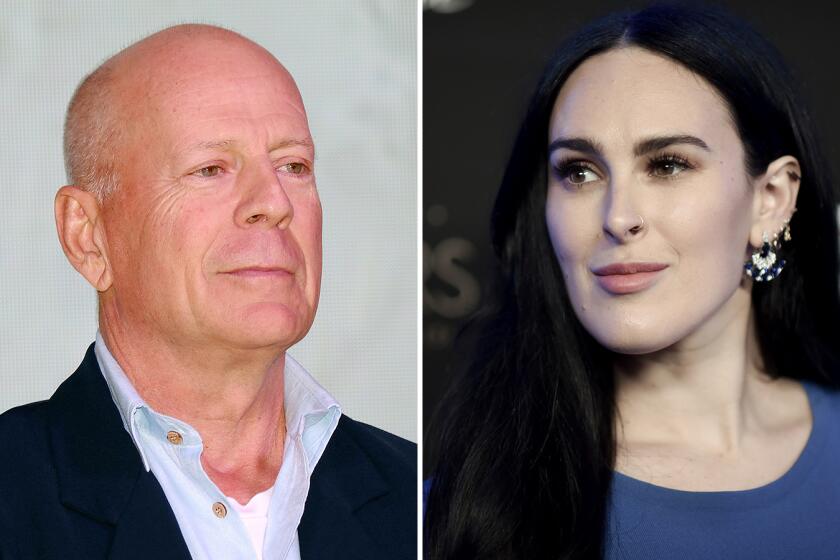Review: No one comes out clean in ‘The Laundromat,’ Steven Soderbergh’s playful Panama Papers comedy
There are several movies packed into the brisk 96-minute spin cycle of “The Laundromat,” none of them perfect but all of them interesting. On its surface a tonally arch, formally whimsical comedy about a bunch of desperate people in dire situations, Steven Soderbergh’s latest swiftly launches the viewer on a globetrotting survey of the many varieties of financial fraud in the 21st century.
The teachers administering this barbed economics lecture are two smug but affable businessmen played by Antonio Banderas and Gary Oldman, wearing tuxedos that are nearly as colorful as the anecdotes and nuggets of insider wisdom they drop in our path. Their stories include a soapy melodrama of upper-upper-class mores, a secret assignation that becomes an assassination, and a tale of a lowly Michigan widow named Ellen who’s trying to get to the bottom of the whole rotten affair.
The individual vignettes don’t compete with one another. Soderbergh springs them one by one, with a matter-of-factness that may remind you of a magician deftly pulling rabbits out of a hat — or, for the less receptive viewer, a traveler popping open the compartments of an in-flight meal. It may not be the tastiest repast, but it does offer more than the usual food for thought, served up with a smile and a self-aware wink. Think of it as the decaf version of “The Big Short.”
But perhaps food and coffee are the wrong metaphors. Adapted by Scott Z. Burns from “Secrecy World,” Jake Bernstein’s 2017 book about the Panama Papers scandal, “The Laundromat” plunges headlong into the intricate workings of offshore bank accounts, shell companies and other means by which the global financial elite hide their wealth and avoid taxes. The movie is both a lesson and a diversion, a movie that seeks to educate by means of trickery and misdirection. It is thus best approached as a kind of cinematic shell game, in which the focus of the story keeps shifting and the full scope of the corruption on display remains just out of view.
Three stars of the Netflix financial services satire “The Laundromat,” directed by Steven Soderbergh, talk about their seriously oddball movie.
The movie allocates most of its screen time to Ellen, partly because everyone loves a working-class hero and partly because this one, for all her many woes, at least has the good fortune to be played by Meryl Streep. A gentle, gregarious woman blessed with the gifts of stubbornness and curiosity, Ellen is drawn into a daisy-chain of financial chicanery after her husband (James Cromwell) drowns with 19 other passengers on a tour boat that capsizes in Lake George, N.Y. Like almost everything that happens in the movie, the accident is drawn from real life: a 2005 tragedy that was compounded by the news that the boating company, Shoreline Cruises, had been sold a fraudulent policy for liability insurance.
The realization that her settlement money has been sucked into a bunch of “empty shells” sends Ellen’s grief tilting into fury, and she goes searching for answers on the Caribbean island of Nevis, one of several remote tax havens for the extremely wealthy. But even as it seems clear where this is headed, Soderbergh and Streep conspire to subvert the conventions of the feel-good crusader drama you only think you’ve been watching. There is nothing hopeful or reassuring about “The Laundromat,” no triumphant resolution in which the dogged outsider brings the fat cats of the 1 percent to their knees.
Which is not to suggest that no comeuppances are forthcoming. Neither Bernstein’s book nor Soderbergh’s movie would exist without the 2015 leak of an enormous trove of documents from Mossack Fonseca, a Panamanian law firm whose money-laundering operations were found to have provided cover for all manner of criminal activities worldwide. In a movie with more than a few false aliases, it spoils nothing to point out that Banderas and Oldman are in fact playing the firm’s chief partners, Ramón Fonseca and Jürgen Mossack (which partly explains Oldman’s comically exaggerated German accent).
But although Soderbergh grants us the eventual satisfaction of seeing Mossack and Fonseca’s scheme unravel, he still lets them hold the narrative reins throughout — a decision that throws your expectations off-balance and subtly shifts the movie’s moral center of gravity. The two men’s swaggering, self-justifying banter is never as uproarious or illuminating as they seem to think it is, but it does encourage us to see every situation through the eyes of the swindler as well as the swindled.
In one especially absorbing story, an African-born businessman (Nonso Anozie) tries to negotiate a truce with his daughter (Jessica Allain) after he’s caught canoodling with her college roommate, providing a glimpse into lifestyles so buffeted by privilege that emotional problems are granted monetary solutions. Later, Matthias Schoenaerts turns up as a British businessman whose complex arrangement with a powerful Chinese client, Gu Kailai (Rosalind Chao), goes dangerously awry. The particulars of Gu’s story are too jaw-dropping to be done justice in a 10-minute subplot, but Soderbergh’s drive-by narrative approach packs its own little sting in the tail.
If the anecdotes that make up “The Laundromat” often seem random or disjointed, it’s because Soderbergh, always fond of experimenting with form, has tried to find a dramatic structure that matches the slippery complexities of his subject. The confusion that this movie sometimes provokes — is all this really happening? Did any of this really happen? Did I just see Sharon Stone? (And David Schwimmer?) — matches the instability of a system in which human lives are connected by little more than pieces of paper, and money itself, more than any individual person, is the all-knowing protagonist invisibly driving the story forward.
This is hardly the first picture in which Soderbergh has studied the disastrous effects of human greed (“Erin Brockovich,” “Traffic” and “The Informant!” are just a few that come to mind), though it may be the first in which he has implicated himself. (In one of many cheeky asides, it’s noted that the director uses no fewer than five shell companies in Delaware, the leading provider of such services in the U.S.) This is the system we have built, the movie seems to be saying, and the fact that it discourages transparency and incentivizes corruption should neither surprise or outrage us.
New Netflix movies by Noah Baumbach, Steven Soderbergh and David Michôd lit up Venice’s Lido before heading (briefly) to theaters and into the thick of awards season.
It should, however, galvanize us toward action, of which “The Laundromat” offers an uneven but vividly confrontational example. Throughout the movie, Mossack and Fonseca make frequent references to “the meek,” a term for society’s lowly have-nots, as well as a reference to the biblical declaration that “the meek shall inherit the earth.” Not for nothing does Soderbergh give us at least three wistful scenes set in churches, including one in which Ellen sits and quietly prays for the punishment of her blithely indifferent persecutors.
Ellen may not be the one who personally sends them behind bars, but Soderbergh and Streep have one last, insouciant ace up their sleeve. Let’s just say they don’t break the fourth wall so much as demolish it, turning their movie inside out in service to their message. I admired the audacity of the gesture more than the gesture itself, which can’t help but supplant one form of elitism with another: The meek may be screwed, but the Streep shall inherit the earth.
‘The Laundromat’
Rating: R, for language, some sexual content and disturbing images
Running time: 1 hour, 36 minutes
Playing: Opens Friday at the Landmark, West Los Angeles; starts streaming Oct. 18 on Netflix
‘The Laundromat’
More to Read
Only good movies
Get the Indie Focus newsletter, Mark Olsen's weekly guide to the world of cinema.
You may occasionally receive promotional content from the Los Angeles Times.







